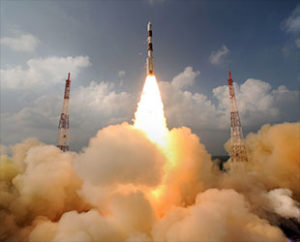
India’s space programme continues to broaden its appeal into Latin America, becoming a truly global competitor in the launch market and beyond. Several countries in the region have made outreach toward working with India in the coming months.
As reported in Indian Defence News this week, Colombia plans to put a satellite into orbit for the first time, expecting to launch it from India in April. This follows less than a year after Chile’s successful launch of a nanosatellite as part of India’s Cartosat-2 launch last June.
Indian Defence News reports that diplomatic sources told the Financial Express that, “the nano-satellite belonging to Colombian air force, ‘Facsat1’, is 30 cm long and 10 metres high, and will serve national security, monitor the effects of climate change and prevent emergencies.”
The Indian space programme’s appeal in Latin America continues to grow and diversify. Brazil, Peru, and Bolivia are already working with the Indian space agency in various ways, according to recent reports.
Many countries in the region, including Brazil, Argentina, Mexico, Ecuador, Chile, Peru, Venezuela, Bolivia, and Nicaragua have also reached out to the Indian Space Research Organization (ISRO) for help in developing and building satellites, thus extending India’s influence beyond the launch pad.
“Following India’s Mars mission a few years ago we have proven that ISRO is capable of achieving even inter-planetary missions in a cost-effective manner, in addition to having a reliable program,” said Rajeswari Pillai Rajagopalan, senior fellow and head of the Nuclear and Space Policy Initiative at the Observer Research Foundation in New Delhi.
Given the research capability that India has, the country should look to assist other countries in similar launches of satellites she said, adding, “Commercial engagements could produce long-term strategic linkages and India should be mindful of those advantages.”


